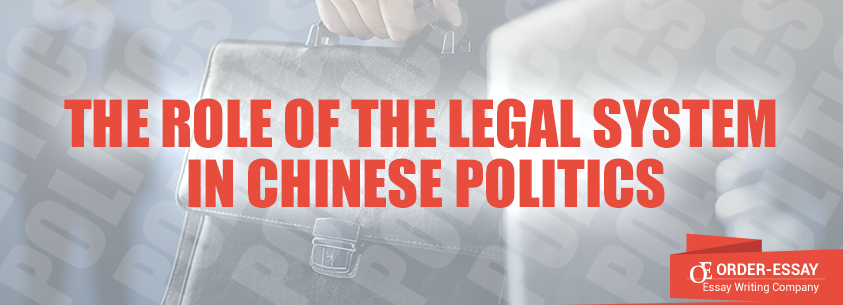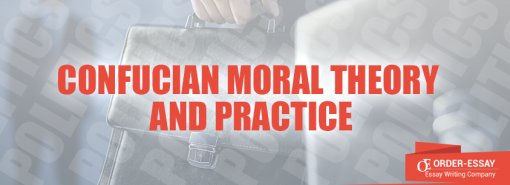
The interplay between politics and the law has ramifications for democracy. According to Cohen (1), in China, politics dominates the law. The law scholar cites examples involving the refusal of the current leadership to accept a number of universal legal values, which previously prevailed in the country. However, Cohen (1) further observes that even in the past, the tenets were partially embraced by some regimes under the communist rule. The above author captures the stark reality about the law in China, indicating that, discussing constitutional changes, even in universities and academic circles, has become untenable. The fact that discussing judicial independence within the communist party is forbidden further reinforces the view that politics continues to undermine the law in the country. Based on the review of the literature, the paper holds that the legal framework is used to advance political interests.
Amusingly, there is no notable resistance to the state of affairs. Although legal experts might be unhappy, they can only register their dissatisfaction passively or discreetly. According to the evaluation, those legal professionals who find it difficult, are forced to abandon their work. In particular, Cohen (1) indicates that many judges have recently resigned to pursue other responsibilities such as academia, business, or legal practice. A possibility exists that if the trend continues, the Chinese legal system will be thrown into a crisis.
The discussion on reforming China’s legal system requires paying attention to the many strides made in the contemporary legal framework of the country owing to its calamitous beginnings. In the first thirty years of the People’s Republic of China (1949-1979), the rule of law had suffered indelible losses (Cohen 1). In 1957, for instance, Mao Zedong imported the Soviet model, which failed drastically. Ideological turmoil persisted as, in 1957-58, the Anti-Rightist Movement emerged, and, later, the Great Leap Forward set in, followed by the Cultural Revolution in 1966. The swift developments undermined the development of a robust legal system in the country. Following the demise of Mao Zedong in 1976, Deng Xiaoping chose to pursue changes both in political and economic spheres; thus, an attempt to alter the legal system also took place. In the development, Deng revived the Soviet model, adding the elements of the Western legal framework. This way, China became open to the universal legal practices and values.
Cohen (1) contends that, since 1979, China has experienced the development of a comprehensive legal framework despite the existing environment of harsh conditions. The Chinese have managed to create a legal environment attractive to the outside world besides building a rich body of knowledge on jurisprudence. Despite the advances made, it remains unclear whether the country can proceed to establish a reliable system that is not only predictable, but also independent of political interference. According to Cohen (2016), at present, popular dissatisfaction with the judiciary is evident. The author further alleges that party officials, the Local People’s Congress, and local government agents rely on their powers to tilt judgments.
In the leadership of Xi Jinping, many similar problems are emerging. Cohen (1-7) observes that, under the current regime, local courts are required to abide by the central party discipline and the demands of judicial officials. In other words, local judges cannot exercise autonomy from the central government. Hence, it is callous for the leadership to pursue changes at the local level while permeating them at the national level.
The link between the Communist Party and the judiciary is likely to drag for long. Principally, the party is in charge of the legal system, across board. Cohen (1-7) backs the observation based on the fact that the Central Political-Legal Commission, which is an appendage of the Party Central Committee, directs the judiciary in its actions. The Ministry of State Security, the Ministry of Public Security, the Ministry of Justice, and the prosecutors have all wrestled over influencing the judiciary. Overall, the level of openness in the country’s legal framework is low.
While assessing China’s socio-cultural influence on the legal system, Lin (100-151) captures critical aspects related to the relationship between politics and the legal system in the country. Based on the study, Lin (146) opines that the feudal political arrangement and the Confucian culture have had a significant influence on the country’s legal system. Some of its implications are evident in the conceptualization of the law, the role of law in society, and its application. In addition, Lin (105) indicates that the social standing of law is basically a function of the PRC’s legal culture.
According to Lin (100), the Chinese legal framework has its roots in Confucianism and Legalism. Whereas the former refers to morality, the latter focuses on the rule of law. Given the influence of the two systems on the Chinese legal system, they are expected to complement each other. However, they are adversarial in nature. The Confucian ideology gives the basis for the substance that anchors traditional law while the Legalist approach constructs the traditional legal framework. Despite the two philosophies being adversarial in their political views concerning the structuring of the Chinese society, they shared some important ideas such as the power of the emperor on all issues, including law. However, it is noted that the Confucian character dominated the Chinese law.
Further, Lin (117) holds that, at given historical times, the attributes of law in society are influenced not only by the environment, but also by traditional practices. Although the role of tradition and culture in affecting the law is mute and sometimes unconscious or implicit, the environment and the law interact. Thus, Confucius’s teachings are critical in Chinese politics. Under such tutelage, the emperor enjoys superior powers. In addition, it alleges that a good government rests on morality and virtue rather than abides by the law. Thus, it is not surprising that the above view persists today.
Referring to the work of Cohen (1-7), it became evident that the law is applied based on the whims of political leaders. In other words, the law has taken a subordinate role to politics. Lin (122) supports the position with his observation that the Confucius philosophy, which has a high degree of influence on Chinese politics, teaches that the emperor should enjoy absolute power. As a result, it is not surprising that the political leaders’ views influence the judiciary in China.



Lin Feng (1-22) has also assessed judicial operations in China, with specific attention to the future of the autonomy of an important arm of government. In his opening statement, Lin Feng correctly observes that many academic works have concentrated on the independence of the judiciary in China. In addition, the above researcher acknowledges that the current regime has commenced a number of reforms in the judiciary. The author supports the position by highlighting the Whitepaper on Judicial Reform publication in 2012 as an important turning point. In addition, Lin (1) indicates that in late 2013, the Central Committee’s third Plenary Session adopted several major changes. Among the most important developments was part 9 that bordered on the Promotion of the Rule of Law. A year later, the 4th Plenary Session of the same committee adopted another milestone focusing on the Deepening of the Rule of Law. In February 2015, the Supreme People’s Court (SPC) adopted the ‘Opinions on Comprehensively Deepening the Reform of the People’s Courts’. In addition, the SPC proceeded to issue a new Whitepaper focusing on judicial reforms.
Basing his argument on de jure judicial autonomy, Lin Feng (2) finds that China has limited judicial independence, constitutionally. As a result, the absence of constitutional protection has allowed the political class to influence and undermine the working of the institution. In addition, the ability of the political leadership to determine the salary of the judiciary has impaired its ability to function independently. Moreover, Lin Feng (4) indicated that the lifelong liability approach that is an imposition of the political class implies that judges cannot exercise independence. The fact that they have to report to People’s Congresses is a clear indication of political interference in the judicial system’s independence.
Lin Feng (4) establishes the absence of personal independence of the judges in China; yet, such autonomy is essential towards building a free legal system. The above author claims that the Chinese tradition has no place in the phrase “personal independence”. As Lin Feng (10) observes, personal autonomy demands non-interference from an individual or organization in adjudication matters.
Internal independence is another significant marker of the system’s autonomy. According to Lin Feng (10), internal autonomy borders on the non-interference in decision-making. Consequently, judges should exercise independence of judicial workmates and supporters. However, the above author found out that the Chinese system lacks internal independence since the judges who hear the case are not the ones who make the rulings. In addition, judgment is made after obtaining a ruling from the Chief Judge, the vice president, or the president of a court. In some instances, the adjudicative committee might have an input. In addition, the problem is compounded by the fact that the perks of the judges are calculated based on the ruling of their cases. As a result, such influence undermines the judicial officers’ independence.
Another significant study on the topic is the one conducted by Eric (331-366) and focusing on judicial reforms in China. The author employs the Positive Political Economy method in assessing the development of judicial reforms in the country. According to Eric (339), formal judicial institutions seem irrelevant to the dispensation of administrative governance. Eric (361) finds that the National People’s Congress pursues its intentions of undermining the competence of the courts and blocking the attempted reforms. In Eric’s findings (345-354), the Supreme People’s Court has managed to circumvent the antics of the NPC by issuing broad readings on administrative statutes. The implication is that the SPC has enhanced the interests of the judiciary by relying on its superior legal knowledge to give the Chinese executive/ State Council supplementary oversight useful in taming defiant agents. However, given the fact that the SPC is an instrument of the NPC, and by virtue of operating as a State security apparatus, the SPC has managed to exercise reasonable independence as it has managed to influence policy through its manipulation of decision costs by the local bureaucracy agents that use decisions against the State Council policy. In other words, the court is working more closely with the State Council.
Get a Price Quote
Eric’s work (331-366) generates intriguing findings. Whereas the author indicates that the SPC is in a position to undermine the NPC through its possession of superior legal knowledge, he goes further to contradict the position by indicating that the two organs have managed to work towards a common course. The latter perspective relates to the role that the court has played in influencing policy developments on judicial issues. As such, Eric’s work (331-366) underscores the influence of the courts in directing policy development. In other words, the legal system influences the politics, with regard to the administration of justice.
Hand (52-160) has also weighed in on the interplay between the law and politics in China. According to Keith (79), the political-legal duality under constitutionalism operates through additional layers. The reference to Marxism reveals that law is a tool of politics. In such a system, the entire legal system (institutional frameworks, courts, prosecutors, state security apparatuses, legal professionals, etc.) are viewed as appendages to the state. This is in line with the work of Cohen (1-7), who indicates that, in China, a political party organ (Central Political-Legal Commission) is in charge of judicial matters. With a political extension taking charge of the legal system, such an institution cannot operate independently. According to Hand (79), Party-Legal Committees are instructed to consider not only the law, but also political interests. In addition, Hand (79) makes findings similar to those of Lin Feng (2) who established that, in China, the constitution refers to the socialist system. Since the socialist legality is the anchor of the constitutional framework, the supremacy of the political party cannot be overemphasized. Overall, Hand (80) observes that China’s judicial system has been highly politicized, and, at present, the political system is being legalized, albeit progressively. Further, the author notes that the populism concept, which is the basis of the law in China, is anti-constitutionalism.
Conclusion
The analyzed literature indicates that the political system uses the legal system to entrench its interests. The findings of Hand (52-160) show that state politics and legality are intertwined although the political system dominates the legal framework. Further, in the prevailing circumstances, it is impossible for Constitutionalism to succeed. Similarly, Eric (331-366) claims that the courts are directing policy development although they work alongside the NPC on legal matters. Lin Feng (10) also found out that various aspects of the State undermine judicial independence. On her part, Cohen (1-7) stresses that under the current order, local courts must abide by the central party expectations. However, all authors agree that reforms are taking place. Although being positive, the researchers such as Lin (1), remark that the State is driving the reforms. Consequently, the political system is ultimately structuring the legal framework to suit its aspirations.








